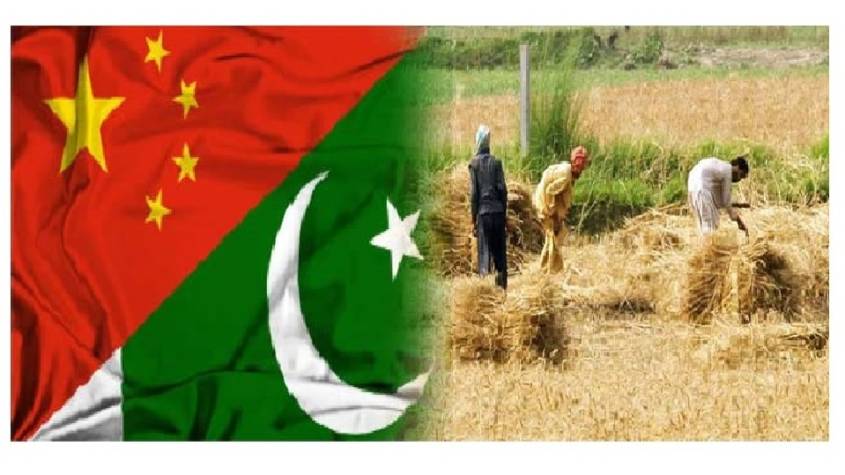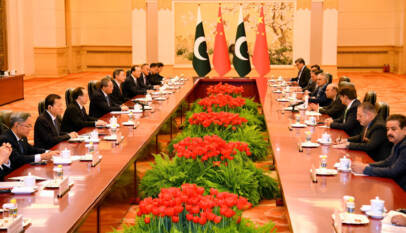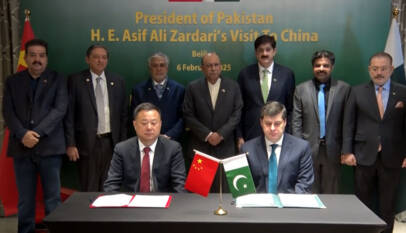China-Pak agriculture cooperation to strengthen under CPEC: Agricultural commissioner at Chinese Embassy to Pakistan
Agriculture Commissioner at the Embassy of China to Pakistan, Gu Wenliang, underlined the significance of bilateral agricultural cooperation in the second phase of CPEC. During a webinar held by the Vehari Chamber of Commerce and Industry, Gu Wenliang underlined China-Pak agricultural cooperation in the four areas. It included the use of Chinese agriculture material, machinery, and technology. Gu Wenliang further suggested that Pakistan should strengthen commercial promotions and marketing of agricultural products.
Pakistan needed to strengthen commercial promotion and marketing for its agricultural products to enhance exports to China.
This was stated by Gu Wenliang, the Agriculture Commissioner, Embassy of China to Pakistan at a webinar held by the Vehari Chamber of Commerce and Industry, Gwadar Pro reported on Thursday.
He said agriculture is one of the key cooperation industries under the second phase of the China-Pakistan Economic Corridor (CPEC).
According to Gu, both of the Chinese and Pakistani governments are committed to strengthening agricultural industry cooperation and encouraging more Chinese enterprises to invest in Pakistan and set up joint venture with potential local partners.
The agricultural industry cooperation will not only increase Pakistan’s yields of crops and keep its food security, but also improve its agricultural products exports to China and other countries and regions.
Gu pointed out that there is great potential for China-Pak agricultural cooperation in the four areas.
Firstly, the average yield of wheat is only 3 tons per hectare in Pakistan, which can be improved substantially by taking the high-yield, anti-drought variety with resistance to insects and pests.
As for rice cultivation, China’s hybrid rice technology is recommended. The Gmo cotton is also proper to be applied in Pakistan.
For sugar cane and potato, the virus free tissue culture sapling could be a good choice.
Second, China has many technologies suitable for crops in Pakistan, including compound planting, smart agriculture, water-saving irrigation and greenhouse.
Recently, two Pakistani students from China’s Sichuan Agricultural University, use the maize-soybean strip intercropping technology in Punjab, which has achieved satisfactory results by now.
The greenhouse planting can also promote the development of vegetables, edible fungus and flowers in Pakistan.
Thirdly, agricultural machinery and agricultural materials. China’s fertilizer and pesticide industries are developed. Now green pesticides and organic fertilizers are being promoted to reduce pollution from agricultural non-point source.
In terms of agricultural machinery, with the 5G and other technologies, smart agricultural machines and implements have been playing an important role in crops’ sowing, harvesting and plant protection in China.
These machines are also suitable for use in Pakistan. Fourthly, agricultural product processing. Pakistan produces a great deal of high-quality fruits and vegetables every year. Due to their short storage period, a lot of them go rotten and cause a great waste.
To solve this problem, they could either be kept by cold chain storage or processed into high value-added products by food processing technology.
On the other hand, enterprises are welcomed to invest in Pakistan to set up meat processing factories and then exports processed meat to China and Middle East countries.
In addition, Gu also gives some suggestions for China-Pak agricultural cooperation.
Both of the two governments should roll out favorable policies in finance and tax to encourage enterprises’ investment and cooperation in agriculture sector.
The second is to strengthen the intellectual property protection for varieties and agriculture-related technologies.
Another one is for China and Pakistan to promote agriculture products trade. To date, China and Pakistan have signed quarantine risk protocols for rice, citrus and mango. The two sides need to accelerate the signing of protocols for onions, potatoes and cherries.
The last one is for Pakistan to make good use of e-commerce, and strengthen commercial promotions and marketing to make more Chinese know more about its high-quality agriculture products, he added.
President Zardari, Premier Li Qiang reaffirm commitment to deepen China-Pakistan strategic partnership
Pakistan and China have underlined the importance of expanding people-to-people and cultur…











